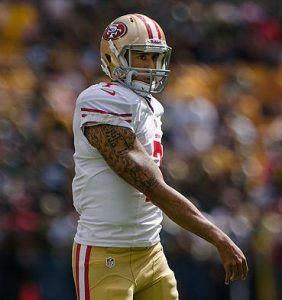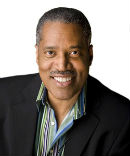 Recent polls find a majority of Americans believe that “race relations,” since the election of the first black president, have gotten worse, not better. Colin Kaepernick, a National Football League quarterback, is Exhibit A for why so many people feel this way.
Recent polls find a majority of Americans believe that “race relations,” since the election of the first black president, have gotten worse, not better. Colin Kaepernick, a National Football League quarterback, is Exhibit A for why so many people feel this way.
Kaepernick signed a $114 million six-year contract in 2014, with $61 million guaranteed. Like President Barack Obama, he is biracial, with a black biological father and white biological mother.
Obama’s father left his wife and toddler son, and from the age of 10, Obama was raised by his white paternal grandparents. Kaepernick’s biological father abandoned his pregnant mother, who put him up for adoption. Kaepernick was adopted by a white couple. A standout athlete in basketball, baseball and football, Kaepernick chose to pursue football, making it all the way to the NFL as a quarterback for the San Francisco 49ers, one of the most storied franchises.
A blessed life, no? Well, apparently not.
Kaepernick, to show solidarity with the Black Lives Matter movement and to make a stand against “oppression,” has chosen not to stand for the national anthem. He said that officers who committed “murder” have been placed on administrative leave.
The first problem with Kaepernick’s “protest” is that the Black Lives Matter movement, launched after the death of black suspect Michael Brown of Ferguson, Missouri, is based on a lie. Contrary to the story told by the lying friend who was with Brown when he was killed by an officer, Brown did not have his hands up and did not say, “Don’t shoot.” Both the grand jury and Department of Justice investigation found that the officer who shot Brown acted lawfully and had reasonable fear for his life.
Still, a “movement” was launched.
According to the Centers for Disease Control, police officer killings of blacks are down 75 percent over the last 47 years. Compared with blacks, twice as many whites are killed by cops. True, blacks represent about 25 percent of those shot by the police, and the black population is just 13 percent, but this has to do with higher rates of offending.
As for Kaepernick, did he live a life compromised by racism and oppression? In an interview, he once talked about how on family vacations, when his parents and siblings checked into a motel, inevitably, “in the lobby of every motel, the same thing always happened, and it only got worse as I got older and taller. It didn’t matter how close I stood to my family, somebody would walk up to me, a real nervous manager, and say: ‘Excuse me. Is there something I can help you with?'” Oh, the humanity! Move over, Jackie Robinson.
Men and women of all colors, ethnicities and races have died for the flag and the national anthem that Kaepernick refuses to honor. How many veterans — some wounded — watch or attend football games only to see their sacrifice disrespected by Kaepernick? How many soldiers who were football fans now lay dead and buried?
Kaepernick defenders say that he has a First Amendment right to protest the national anthem. The First Amendment prohibits government from unduly restricting political speech. The NFL is a private organization. The NBA, for example, requires players to stand for the national anthem. The NFL does not, leaving it up to the players. Good thing Kaepernick chose football. So, as protests go, Kaepernick risks very little. Sure, his popularity has taken a hit, with some fans having taken to burning his jersey. But he’s guaranteed millions, no matter what.
Contrast this “protest” with that of former Major League Baseball player Curt Flood. Nearly 50 years ago, Flood, a black player, courageously challenged baseball’s infamous “reserve clause” that tied a player to a team until the team no longer wanted that player. Flood’s team traded him, and he refused to go, arguing that he was not “a piece of property to be bought or sold” by his team with no say-so.
Flood fought all the way to the Supreme Court, before eventually losing. Flood became a league pariah and even, for a time, engendered the animosity of baseball fans. He career was effectively over as a result of the years-long losing fight. But his protest forced the MLB (followed by national league football, hockey and basketball) into granting players free agency, which led directly to the rich contracts today’s professional athletes, like Colin Kaepernick, enjoy.
One might think that an athlete like Kaepernick, not long ago fined for calling an opposing player the N-word, would be a tad reluctant to blast America for its alleged racism and oppression. But this is about America’s racism, not his own. The recent Will Smith movie “Concussion” argues that football causes brain damage. As for Kaepernick, it might well be a case of early onset.
COPYRIGHT 2016 LAURENCE A. ELDER
DISTRIBUTED BY CREATORS.COM
Photo credit: By Mike Morbeck – Flickr: Colin Kaepernick, CC BY-SA 2.0, Wikimedia Commons
 Larry Elder is a best-selling author and radio talk-show host. To find out more about Larry Elder, or become an “Elderado,” visit www.LarryElder.com. Follow Larry on Twitter @larryelder.
Larry Elder is a best-selling author and radio talk-show host. To find out more about Larry Elder, or become an “Elderado,” visit www.LarryElder.com. Follow Larry on Twitter @larryelder.
The views expressed in opinion articles are solely those of the author and are not necessarily either shared or endorsed by Black Community News.
 CURE News and Clergy Blog News and Commentary for Christians
CURE News and Clergy Blog News and Commentary for Christians




I dont see how the hands up dont shoot thing was a lie when the first person to put his hands up in reaction to Michael Brown was a white man imitating him while being viscerally recorded. He had his hands up saying “He had is fing hands up”. Again he was imitating Michael Brown. After that a black man walked passed and said he was not an fing threat. I read the court report and most of the witnesses reported the same thing. So you had the majority of the witness and viscerally recorded witnesses saying the same thing yet there was no trial.
To say that it was lie is to go against the best evidence and the majority of the evidence.
go ahead and believe the hands up lie, then you can voter for HilLIARy